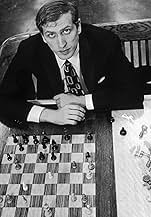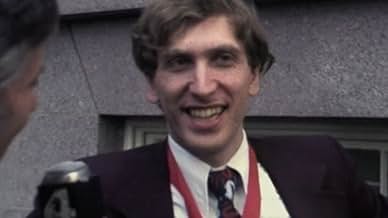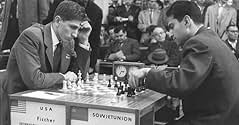Aggiungi una trama nella tua lingua'Bobby Fischer Against the World' is a documentary feature exploring the tragic and bizarre life of the late chess master Bobby Fischer. The drama of Bobby Fischer's career was undeniable, f... Leggi tutto'Bobby Fischer Against the World' is a documentary feature exploring the tragic and bizarre life of the late chess master Bobby Fischer. The drama of Bobby Fischer's career was undeniable, from his troubled childhood, to his rock star status as World Champion and Cold War icon, t... Leggi tutto'Bobby Fischer Against the World' is a documentary feature exploring the tragic and bizarre life of the late chess master Bobby Fischer. The drama of Bobby Fischer's career was undeniable, from his troubled childhood, to his rock star status as World Champion and Cold War icon, to his life as a fugitive on the run. This film explores one of the most infamous and myste... Leggi tutto
- Candidato a 1 Primetime Emmy
- 1 vittoria e 5 candidature totali
- Self
- (filmato d'archivio)
- Self
- (as Dr. Anthony Saidy)
- Self
- (filmato d'archivio)
- Self
- (filmato d'archivio)
- Self
- (filmato d'archivio)
- Self
- (as Fernand Gobet PhD)
Recensioni in evidenza
The key historical event that the film revolves around is the 1972 World Championship against the Soviet grandmaster Boris Spassky. This dramatic confrontation hosted in Iceland had huge political significance seeing as it set the American against a Russian at the height of the cold war. As a result it was probably the most internationally famous chess match ever played. Even at this early stage, however, Fischer's erratic behaviour is quite evident. He almost never made it in the first place due to his own personal demons, when finally there he arrived absurdly late and then proceeded to complain about the hum of the TV cameras. You might find yourself wishing that the dignified Spassky actually defeated this highly strung man. But this is partially why this documentary is an interesting one, as its central character is not particularly likable at all. There is very little actual footage of Fischer; he remains a very enigmatic figure. After the Spassky match less and less is seen of him, so much so that his next public appearance in a match in Yugoslavia occurs the best part of twenty years later. In agreeing to this he contravenes international law, seeing as this country was in the midst of a terrible war. The sight of Fischer publicly spitting on the letter warning him that he would be breaking international law is a grim one indeed; the years that followed until his death in 2008 seem to be equally mysterious and sad.
Bobby Fischer Against the World is a very good documentary about a troubled man who was destroyed by the only thing he loved. The documentary states that he was the greatest player there ever was. Personally I think this is a somewhat romantic statement based mostly on the drama of his ascent. But for sure, he was one of the most fascinating chess players that ever lived and in many respects remains an enigma still.
This historical event is dramatically recounted in Liz Garbus' new documentary, Bobby Fischer Against the World. The film explores the rise and fall of the chess world's bad boy: from a poor, self-taught child prodigy to a venerated world champion and, finally, a reviled paranoiac. The film divides Fischer's life into three parts, with the middle centring on that famed 1972 match in Reykjavik.
The trajectory that the film traces is rather clichéd, but along the way it does raise a number of intriguing questions: What is the nature of genius? What does it take to make a champion? What are the causes of mental illness? The film hints at how the young Bobby Fischer was affected by growing up without a father and being raised by a lefty mother in a poor Brooklyn household at the height of red-baiting. It looks at how fame affected Fischer, a recluse who cherished privacy, and it explores the nature of the game of chess itself, the mental as well as physical stamina it requires. The film also shows how Bobby and Boris became pawns (if willing ones) in the Cold War stand-off between the US and the USSR.
Considering its wide scope, it is neither surprising nor disappointing that Bobby Fischer Against the World raises more questions than it answers. Garbus largely leaves it to the viewer to draw their own conclusions about what to make Fischer's life and personality. The documentary intersperses newsreel footage, still images by photographer Harry Benson (who was granted unique access to Fischer), and talking heads that include Henry Kissinger, Fischer's brother-in-law, his chess contemporaries, various fans and historians.
One of the interviewees refers to Fischer as 'the Mozart of chess'. Indeed, he started teaching himself the game at the age of six, spending all his free time studying strategies and playing against himself. Just a few years later he was frequenting chess clubs in Manhattan and soon he was taking on up to 40 adults at a time. At 14, he became the youngest US Open Champion ever.
By contrast, Spassky's home country was a place that talent-spotted, honed and coached their chess players. In the Soviet Union, chess was not just a sophisticated boardgame, but a matter of collective, national pride.
So when the two players went up against each other in Iceland, the match was loaded with symbolism. As another chess grandmaster, Garry Kasparov, says in the film, Fischer was 'representing the entire free world'. At the time, an American TV news bulletin put the latest news about Fischer above the Watergate scandal and soaring unemployment in the US. And when the notoriously demanding and elusive chess champion at first failed to show up in Iceland, Kissinger himself called Fischer up, urging him to go.
In an interview after his World Championship win, Fischer said he felt like something had been taken out of him. Having achieved the ultimate accolade, Fischer became more and more of a recluse and failed to defend his title three years later. For the chess world, this was a great betrayal.
Fischer only resurfaced for a bizarre 'comeback' 20 years later in a 1992 re-match against Spassky in the former Yugoslavia, which was then under United Nations sanctions. Fischer ended up winning the rematch, but the price was high. He was indicted by the United States for defying a presidential ban against commercial dealings with Yugoslavia, facing fines and a 10-year prison sentence if he returned. His old friend and bodyguard managed to secure him citizenship in Iceland, where he died in 2008.
When he returned to the public eye in 1992, Fischer was wild-haired, podgy and virulently anti-Semitic. Although both his parents were Jews, Fischer got mired in conspiracy theories, reading pamphlets about the Illuminati and The Protocols of the Elders of Zion. In a radio phone-in just after 9/11 he gloated over the Twin Tower attacks. Having been paraded in front of cameras as an American hero as a child, and taken pride in beating the Russians as a young man, at the end of his life Fischer was an outcast and a self-made enemy of the state.
Bobby Fischer Against the World suggests that there is something about the game of chess that not only attracts, but also contains or focuses great minds. As an interviewee in the documentary notes 'A good chess player is paranoid on the board, but then if you take that paranoia to real life it doesn't play so well'. Once chess was no longer his sole obsession, Fischer seems to have begun to imagine that there were some hidden strategies behind people's every move. And he is not the only who comes off as paranoid in the film. In the course of the 21 individual games that Fischer and Spassky played during those three summer months in Iceland, Spassky claimed that his opponent was using electronic and chemical devices to control and unsettle him. A thorough police search of the room where the match took place failed to find any such devices.
In the end, Garbus' film makes no excuses for Fischer's despicable views while at the same time showing that, regardless of his disappointing private ending, Fischer's remarkable achievements still remain an inspiration.
First she had to portray Fischer's complex character. Since filming started after his death, Garbus had to dig up footage—scattered around the world—and weave together the various strands of Fischer's life. Not only that, she had to gather together all those who played important role in his life.
The second critical obstacle for Grabus was that she had to depict the period where the tension of the Cold War was emerging (because of the Vietnam War), and the whole world was going through major changes, with the entire planet becoming a mortal battlefield. Although chess had started to become popular, the hostility of that time was somehow deeply reflected on the chessboard, and this was soon exploited even more, when the world of politics penetrated into the world of chess.
Garbus' third critical obstacle was that Fischer's life can be divided into three parts: i) his life (and chess career) before 1972, ii) his battle for the title in 1972, and iii) his life after 1972. This means that Fischer's life is often summarized within the boundaries of a single event, stripping away all the aspects that formed his character up to that point. How was Garbus then, going to tell the story of a man who spent half his life playing chess and then disappeared? To overcome these obstacles, Garbus chooses a nonlinear storytelling. Going back—to Fischer's childhood and early years, and then later—forward to his life after the championship games, Garbus uses the 1972 events as the spine of the story.
Visiting Fischer's childhood and adolescence, Garbus shows us his love for (and dedication to) chess, his mother's strong personality, his father's abandonment and absence, and how the precipitate publicity affected his privacy. But what no one mentions in the interviews is that Fischer, at a young age, struggled to gain the respect of others. He was a boy among men, playing (and trying to understand) their game. That struggle was slowly draining away Fischer's childhood (and transforming the first 29 years of his life to a prolonged chess game), the result of which Garbus masterfully displays—at what could be the climax of the film—when she shows Fischer, soon after he won the title, in an amusement park sitting inside a little airplane—flying towards his lost childhood.
The tense climate between the U.S. and the Soviet Union—and its echo in the chess world, is brilliantly shown by Garbus through the rare and previously unseen footage she managed to dig up. Unfortunately, Spassky is the great absentee from this documentary. Although the title of the film is Bobby Fischer Against the World (meaning that Fischer fights against everyone and no one at the same time, indicating that Fischer's whole world is nothing but chess—and Fischer himself is nothing but chess—therefore Fischer's only opponent is Fischer), Garbus mistakenly diminishes Spassky's unique and independent personality by putting him in the same basket with all the others. After all, Spassky was the final external obstacle in Fischer's road to the crown—the one guy he did not yet win. And to paraphrase Thorarinsson, "I think we can agree on the point that Mr. Spassky exists".
However, Garbus does a great job regarding the events of 1972. She leaves out, though, the drama of the two players not having similar chairs (with Fischer's chair being superior to Spassky's), but generally, she covers the events accurately enough: from Fischer's training program, his antics of not showing up, his lists of demands, his growing hatred towards the Soviets, the defending of his principles, the antipathy to cameras and photographers, to his so long-awaited win, Garbus quietly and unpretentiously illustrates the events of the 1972 summer in Iceland.
There is another level in this documentary, a hidden level that Garbus unconsciously created. All the interviewees in the film are trying to label Fischer to a degree that fits their world of understanding. They believe that Fischer should have a particular role in their world, and serve that role in a specific manner.
We are in a society where everyone needs something to have a form in order to understand it. That's why we put labels on everything, and don't let things just be. In that sense, for me, Fischer died in 1972 and reborn after that, as a man with no home and no childhood, trying to play chess on a higher level, the one we all play and eventually lose
Chess has survived for thousands of years and is arguably the hardest game in the world. Through the eons, if there is one name or one master that has towered above anyone else, it is the American Bobby Fischer. When Fischer defeated Boris Spassky in 1972, the match created more publicity than any other chess event in history (even more than when IBM's computer Deep Blue defeated Garry Kasparov in 1996). A lone American had defeated the mighty Soviet chess machine during the cold war. What should have been just the beginning of an already great career for Fischer, it was actually just the end.
Bobby Fischer made one of the great disappearances of any famous person of the 20th century. He did not die, but was as elusive as Bigfoot after he won the world championship. For those who encountered him only would end of becoming frustrated because they realized he was slowly going insane. 20 years after winning the Championship (1992), Fischer reappeared to play Spassky for another match. When he appeared, it became even more obvious that the man had lost his mind. When the September 11th attacks happened, Fischer shocked the world when he applauded the acts on a radio program. He never played again and passed away in 2008.
This HBO program is fantastic in that it is presented in a manner that is suitable for those who barely know anything about chess or those who know the intricate details of Fischer's career and life. It keeps the viewers' attention by playing nice music in the background throughout. The program shows numerous photographs and television footage that most people have never seen. The central focus of the program is the Fischer - Spassky match of 1972, but it juxtaposes all kind of other topics such as Fischer's family and love life, and his affiliation with a cult group. The program even has Henry Kissinger talking about the match. Kissinger had encouraged Fischer to follow through with the match when Fischer was about to not show up. But, the program does not blame Fischer's religious obsession with chess for this mental breakdown. It posits that it could have been a possibility.
I will have to strongly disagree with one part of this documentary. It stated that when after Fischer won the world championship, he was arguably the most famous man in the world (aside from Jesus). I find this really hard to believe. One because Fischer was a merely just a chess champion and (2) there were many other gigantic figures at that time; Muhammad Ali, Richard Nixon, Chairman Mao, just to name a few.
In the end, the enigma will always remain the enigma. Nobody really knows why Fischer quit playing after 1972 or what caused his mental disintegration. Even though he forfeited his title to Karpov in 1975, why did he completely give up playing even tournaments and simuls altogether? What we are left is speculation. Many chess lovers will proudly proclaim that Fischer was the best player of all time. There maybe some truth to this, but I believe Garry Kasparov finally deserves this title. This is because Kasparov was willing to take on all comers, human beings or computers. Kasparov did this for almost 3 decades. Kasparov defeated an ongoing Champion Anatoly Karpov (one of the top 5 players ever) 5 times and he continued to defend this title beating brilliant and talented young players - Ivanchuck, Shirov, Topalov, Anand, Short, Leko, Kramnik, Kamsky, and so many others for another 2 decades.
*Please do not comment if you are going to get into a "greatest ever" debate - it will be yet another endless discussion and will lead to nowhere.* Fishcer's story is one of the great tragedies of chess, but in the short time that he was brilliant, he shined so brightly that it continues to illuminate to this day. Although his life ended to a sad decline, keep in mind, we remember and admire him for what he produced.
Lo sapevi?
- QuizThough Bobby Fischer hated Soviet players for what he considered collusion i.e. drawing matches between themselves so they could concentrate on beating non-Soviet players like Fischer, Bobby Fischer liked and respected Boris Spassky. In turn, Spassky returned the affection and esteem.
- Citazioni
Larry Evans - Former Champion: Reportedly, Fischer's last words were: "Nothing is so healing as the human touch".
- ConnessioniFeatured in Ebert Presents: At the Movies: Episodio #1.20 (2011)
- Colonne sonoreTheme from Shaft
Words and Music by Isaac Hayes
Published by Irving Music, Inc. (BMI)
Performed by Isaac Hayes
Courtesy of Stax Records
By arrangement with Concord Music Group, Inc.
I più visti
- How long is Bobby Fischer Against the World?Powered by Alexa
Dettagli
- Data di uscita
- Paesi di origine
- Siti ufficiali
- Lingue
- Celebre anche come
- Bobby Fischer: Genius and Madman
- Luoghi delle riprese
- Aziende produttrici
- Vedi altri crediti dell’azienda su IMDbPro
Botteghino
- Lordo in tutto il mondo
- 90.511 USD
- Tempo di esecuzione1 ora 33 minuti
- Colore
- Proporzioni
- 1.78 : 1


























